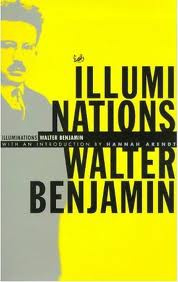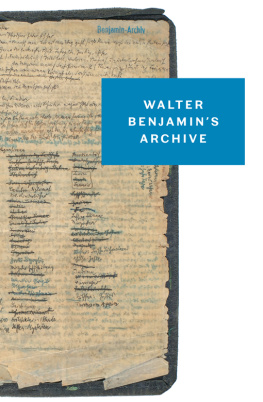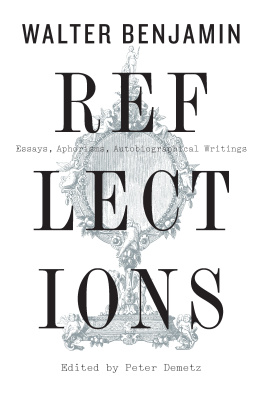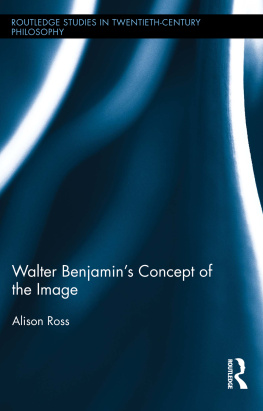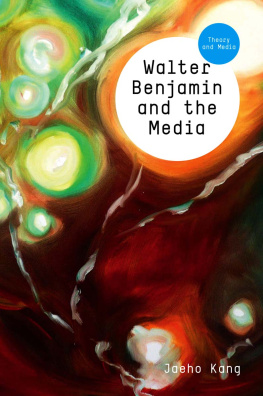
TOWARD THE CRITIQUE OF VIOLENCE
A Critical Edition
WALTER BENJAMIN
EDITED BY
Peter Fenves and Julia Ng
STANFORD UNIVERSITY PRESS
Stanford, California
STANFORD UNIVERSITY PRESS
Stanford, California
English translation 2021 by the Board of Trustees of the Leland Stanford Junior University.
All rights reserved.
Toward the Critique of Violence was originally published in German under the title Zur Kritik der Gewalt, 1921, Archiv fr Sozialwissenschaft und Sozialpolitik; all but two of Benjamins other writings were first published in Walter Benjamin, Gesammelte Schriften, ed. Rolf Tiedemann and Hermann Schweppenhuser, 7 vols., 197291, Suhrkamp Verlag.
Notes toward a Work on the Category of Justice is a revision of the translation that first appeared in Peter Fenves, The Messianic Reduction: Walter Benjamin and the Shape of Time, 2011, Stanford University Press.
Literature for a More Fully Developed Critique of Violence and Philosophy of Law is a translation of the previously unpublished Literatur zu einer ausgefhrteren Kritik der Gewalt und zur Rechtsphilosophie, WBA 508/16 [= I MS 1858], in the Walter Benjamin Archiv; both appear here with the permission of the Hamburger Stiftung zur Frderung von Wissenschaft und Kultur.
Selections from Hermann Cohen, Ethics of Pure Will, were originally published in German under the title Ethik des reinen Willens, 1907, Cassirer.
Kurt Hiller, Anti-Cain: A Postscript to Rudolf Leonhards Our Final Battle against Weapons, was originally published in German under the title Anti-Kain: Ein Nachwort zu dem Vorhergehenden, 1919, Das Ziel: Jahrbcher fr geistige Politik.
Selections from Georges Sorel, Reflections on Violence, were originally published in French under the title Rflexions sur la violence, 1921, Marcel Rivire.
Selections from Erich Unger, Politics and Metaphysics, were originally published in German under the title Politik und Metaphysik, 1921, Verlag David.
Emil Lederer, Sociology of Violence: A Contribution to the Theory of Social-Formative Forces, was originally published in German under the title Soziologie der Gewalt: Ein Beitrag zur Theorie der gesellschaftsbildenden Krfte, 1921, Die weien Bltter, neue Folge.
Introduction and Afterword 2021 by the Board of Trustees of the Leland Stanford Junior University.
All rights reserved.
No part of this book may be reproduced or transmitted in any form or by any means, electronic or mechanical, including photocopying and recording, or in any information storage or retrieval system without the prior written permission of Stanford University Press.
Printed in the United States of America on acid-free, archival-quality paper
Library of Congress Cataloging-in-Publication Data available upon request.
ISBN: 9781503627680 (ebook)
Cover design: Rob Ehle
Frontispiece and cover image: Walter Benjamin, Literature for a More Fully Developed Critique of Violence and Philosophy of Law. Akademie der Knste, Berlin, Walter Benjamin Archiv 508/16. Hamburger Stiftung zur Frderung von Wissenschaft und Kultur.
Text design: Kevin Barrett Kane
Typeset at Stanford University Press in 11/14 Arno Pro
Contents
by Peter Fenves
by Walter Benjamin
by Julia Ng
Note on the Translation of Benjamins Writings
During the period in which Benjamin wrote Zur Kritik der Gewalt (Toward the critique of violence), he was also translating the poetry of Charles Baudelaire and reflecting, in turn, on Die Aufgabe des bersetzers (The task of the translator), to cite the title of the essay he wrote as a preface to his edition of Baudelaires Tableaux parisiens (4:921; SW 1:25363). Beginning with its first sentence, which identifies the task (39) at hand, Toward the Critique of Violence resonates with The Task of the Translatorso much so that the former became preparation for the latter, and the latter can be seen as a distillation of certain elements of the former. In translating Baudelaire, Benjamin had imposing predecessors, including Stefan George, perhaps the most prominent poet of the period; by contrast, in translating several long passages from Georges Sorels Rflexions sur la violence (Reflections on violence) for inclusion in Toward the Critique of Violence, he was on his own. Note 40 to the essay (see 288) is specifically concerned with the manner in which Benjamin addresses some elements of the task of the translator in relation to Sorels work; more broadly, the striking choices Benjamin makes in his own translations of French political and legal terminology inform the translation of his writings throughout this volume. And in all of the commentary that accompanies Toward the Critique of Violence, ranging from the Introduction through the endnotes to the Afterword, individual problems of translation come under discussion, while the Glossary at the end of the volume provides a brief summary of our lexical choices. With respect to the conflict between the two tendencies that circumscribe the task of the translatorfidelity to the original, on the one hand, and freedom in service to accessibility, on the other (4:1719; SW 1:25961)the translations in this volume are more inclined toward the former than the latter, even as they seek to make Benjamins work comprehensible to contemporary English-speaking readers in all of its alluring and disconcerting complexity.
Julia Ng is the translator of Toward the Critique of Violence, while Peter Fenves translated the Associated Notes and Fragments, with the exception of the final one, Note 22, which Julia Ng prepared in conjunction with her editing of this hitherto unpublished text. Julia Ng consulted the manuscript originals whenever available and used them to establish the textual basis for the translations, which at times involved reconstituting and reformatting the texts; any deviations from existing published versions can be taken as corrections of the latter. Both editors reviewed and adjusted translations throughout the volume for accuracy and consistency. Benjamins own notes appear as footnotes; the editors are jointly responsible for the endnotes to his writings.
Acknowledgments
The editors would like to thank Lisa-Marie Fleck and Nora Mercurio at Suhrkamp Verlag for working with us on the texts written by Walter Benjamin included in this volume. We are also grateful that the Hamburger Stiftung zur Frderung von Wissenschaft und Kultur and the editors of the new Kritische Gesamtausgabe of Benjamins works granted us permission to include a previously unpublished manuscript located at the Walter Benjamin Archiv at the Akademie der Knste in Berlin. The editors thank Ursula Marx of the Walter Benjamin Archiv for making available facsimiles of the originals of the associated writings for our reference. In addition, Julia Ng would like to thank Dr. Gregor Wolff and Gudrun Schumacher at the Ibero-American Institute in Berlin for granting her access to the Walter Lehmann Archive.
The editors, furthermore, thank Dr. Harald Ltzenkirchen, who, as the president of Kurt-Hiller Gesellschaft, e. V. Hamburg, granted us permission to publish an English translation of Anti-Kain. We are grateful to Dr. Esther Ehrman for permission to publish a translation of passages from Erich Ungers Politik und Metaphysik. David Biale, Markus Hardtmann, Christine Helmer, Jrg Kreienbrock, Gary Saul Morson, Benjamin Sommer, Samuel Weber, and Jrgen Wehnert generously responded to queries concerning especially difficult terms, citations, and allusions. Ariel Weiner reviewed the final version of the manuscript, and Jonas Rosenbrck compiled the index. Finally, we are beneficiaries of detailed and helpful suggestions made by two anonymous readers of earlier versions of the translations in this volume.


